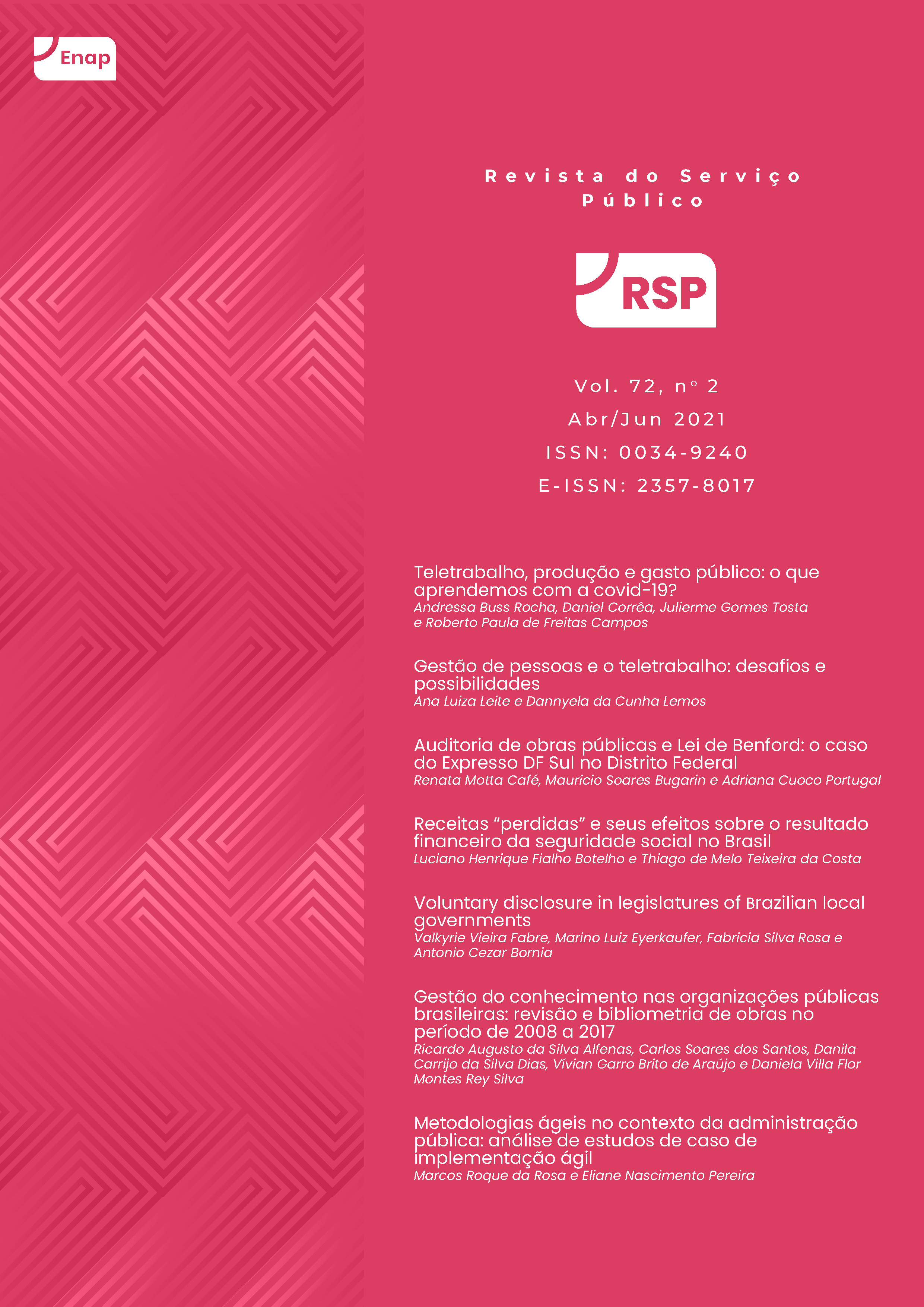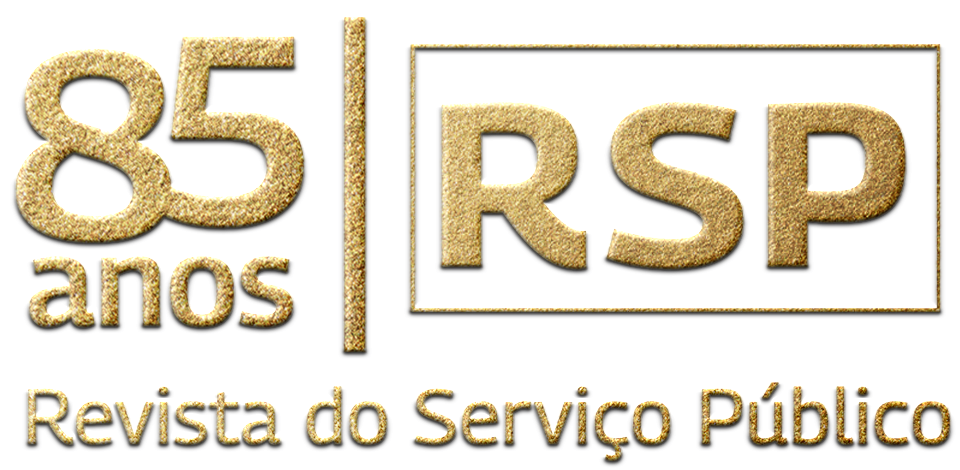Voluntary disclosure in legislatures of Brazilian local governments
DOI:
https://doi.org/10.21874/rsp.v72i2.3280Keywords:
disclosure theory, voluntary disclosure, local legislative governmentAbstract
The disclosure of information is mandatory under Brazilian law, and the government must provide easily accessible information to the population. In the hierarchy of government, local government is in the closest proximity to the citizens. The legislative chamber of the local government makes up the largest group of representatives elected by the people. Thus, it is essential for the local legislature to pioneer information disclosure. Based on prior disclosure theory research, this article aims to investigate voluntary disclosure among the legislatures of Brazilian city councils, using information available on their official websites. A unique research instrument was developed for the purpose of this study and validated through the Classical Test Theory. We found that a lack of transparency in legislative activities and publicity of government involvement can result in lower levels of voluntary disclosure. Among all the regions of Brazil, the Southeast area had the highest voluntary disclosure, followed by the South, Midwest, Northeast, and North. The results justify the recent social movements among the Brazilian people demanding higher levels of transparency, accountability and disclosure of public administration activities.
Downloads
References
AKUTSU, L., & PINHO, J. A. G. (2002). Sociedade da informação, accountability e democracia delegativa: Investigação em portais de governo no Brasil. Revista de Administração Pública, v. 36, n. 5, p. 723-745.
ANDRADE, R. G., & RAUPP, F. M. (2017). Transparência do legislativo local à luz da Lei de Acesso à Informação: Evidências empíricas a partir dos maiores municípios brasileiros. Desenvolvimento em Questão, v. 15, n. 41, p. 85-130.
AVELINO, B. C., CUNHA, J. V. A., LIMA, G. A. S. F., & COLAUTO, R. D. (2014). Características explicativas do nível de disclosure voluntário de municípios do Estado de Minas Gerais. Revista de Administração, Contabilidade e Economia, v. 13, n. 2, p. 571-608.
BOTELHO, M. M. (2009). Gestão administrativa, contábil e financeira do legislativo municipal. Curitiba: Juruá.
BRAGA, S. S. (2007). Podem as novas tecnologias de informação e comunicação auxiliar na consolidação das democracias? Um estudo sobre a informatização dos órgãos legislativos na América do Sul. Opinião Pública, 13 (1): 1-50c Campinas.
CHOI, J. M. (2017). Factors influencing public officials' responses to requests for information disclosure. Government Information Quarterly.
CRUZ, C. F., FERREIRA, A. C. S., SILVA, L. M., & MACEDO, M. A. S. (2012). Transparência da gestão pública municipal: um estudo a partir dos portais eletrônicos dos maiores municípios brasileiros. Revista de Administração Pública, v.46, n.1, p.153-176.
CRUZ, N. F., TAVARES, A. F., MARQUES, R. C., JORGE, S., & SOUSA, L. (2015). Measuring Local Government Transparency. Public Management Review, 18 (6) 866-893.
CUNHA, M. A. V. C., FREGA, J. R., & LEMOS, I. S. (2011). Portais de serviços públicos e de informação ao cidadão: uma descrição do perfil do visitante. Revista Eletrônica de Sistemas de Informação, v.10, n. 1, p. 1-19.
FERREIRA, M. G. (1995). Do processo legislativo. (3a ed.) São Paulo: Saraiva.
FREIRE, F. R., & STABILE, M. (2013). As novas tecnologias e a participação eletrônica: Entre promessas e desafios. Pesquisa sobre o uso das tecnologias da informação e comunicação no setor público: TIC Governo Eletrônico. Comitê Gestor da Internet no Brasil, p. 47-56.
HENDRIKSEN, E. S., & VAN BREDA M. F. (1999). Teoria da contabilidade. (5a ed.) São Paulo: Atlas,.
HENNINGER, M. (2017). Government information: Literacies, behaviours and practices. Government Information Quarterly, 34, 8 –15.
INSPER, Instituto de Ensino e Pesquisa. (2012). Relatório final de indicadores de desempenho para a Câmara Legislativa Municipal de São Paulo. São Paulo: Câmara Legislativa Municipal de São Paulo.
KYU-NAHM, J., WANG, F., WANG, D. (2014). E-Government Use and Perceived Government Transparency and Service Capacity - Evidence from a Chinese Local Government. Public Performance & Management Review, Vol. 38 (1), 125-141.
LESTON-BANDEIRA, C. (2014). The pursuit of legitimacy as a key driver for public engagement: The European Parliament case. Parliamentary Affairs - Oxford University Press on behalf of the Hansard Society, 67, 415–436.
LUQUE, S. G. (2012). Modelo de análisis del uso de internet para promover la participación ciudadana en los procesos de toma de decisión pública (poderes Ejecutivo y Legislativo). Signo y Pensamiento, Agendas, 31, 18-36.
MCNUTT, K. (2014). Public engagement in the Web 2.0 era: Social collaborative technologies in a public sector context. Canadian Public Administration, v. 57, n. 1, p. 49–70.
MENEGUIN, F. B., MAGNA, I. (2014). Desempenho do Poder Legislativo: como avaliar? Brasília: Senado Federal, Núcleo de Estudos e Pesquisas (Texto para Discussão nº155).
MOON, M. J. (2002). The evolution of E-Government among municipalities: Rhetoric or reality? Public Administration Review, 62 (4), 424-433, 2002.
NAKAGAWA, M., RELVAS, T. R. S., & DIAS, J. M. (2007). Accountability: a razão de ser da contabilidade. Revista de Educação e Pesquisa em Contabilidade – REPEC, 1 (3), 83-100.
PRADE A., & FABRE, V. V. (2018). Poder Legislativo municipal: Análise dos gastos com pessoal nas capitais brasileiras. Revista Brasileira de Contabilidade, v. 229, n. 1, p. 75-83.
RODRIGUES, M. S. A. (2017). Escala de Mokken, TCT ou TRI: qual é a melhor opção? 1 ed, Rio de Janeiro: Autobiografia.
RAUPP, F. M., & PINHO, J. A. G. (2013). Accountability em câmaras municipais: Uma investigação em portais eletrônicos. Revista de Administração, v. 48, n. 4, p. 770-782.
VERRECCHIA, R. E. (2001). Essays on disclosure. Journal of Accounting and Economics, v. 32, p. 97-180.
WALL, A., & MARTIN, G. (2010). The disclosure of key performance indicators in the public sector. How Irish organizations are performing. Public Management Review, 5 (4), 491-509.
YAVUZ, N., & WELCH, E. W. (2014). Factors affecting openness of local government websites: Examining the differences across planning, finance and police departments. Government Information Quarterly, 31, p. 574–583.
Downloads
Published
How to Cite
Issue
Section
License
Copyright (c) 2021 Revista do Serviço Público

This work is licensed under a Creative Commons Attribution-NonCommercial-ShareAlike 4.0 International License.
- A RSP adota a licença Creative Commons (CC) do tipo Atribuição – Uso Não-Comercial (BY-NC).
- A licença permite que outros remixem, adaptem e criem obra licenciada, sendo proibido o uso com fins comerciais.
- As novas obras devem fazer referência ao autor nos créditos e não podem ser usadas com fins comerciais, porém não precisam ser licenciadas sob os mesmos termos dessa licença.
- Ao publicar o artigo na RSP, o autor cede e transfere para a ENAP os direitos autorais patrimoniais referentes ao artigo.
- O artigo publicado na RSP não poderá ser divulgado em outro meio sem a devida referência à publicação de origem.
- O autor que tiver o artigo publicado na RSP deverá assinar o Termo de Concessão de Direitos Autorais (em momento oportuno a editoria da Revista entrará em contato com o autor para assinatura do Termo).



